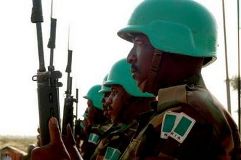Arab leaders agree to finance AU troops in Darfur
Mar 28, 2006 (KHARTOUM) — Arab leaders Tuesday reached a summit deal to provide funding for cash-strapped African Union troops in Sudan’s Darfur region amid international pressure to accept the dispatch of a UN force.
 The move came after Sudan pressed fellow members of the Arab League to reject plans for the deployment of UN peacekeepers to Darfur, where war, disease and famine have cost up to 300,000 lives in three years.
The move came after Sudan pressed fellow members of the Arab League to reject plans for the deployment of UN peacekeepers to Darfur, where war, disease and famine have cost up to 300,000 lives in three years.
Announcing a deal after a closed-door session at the summit, Yemeni President Ali Abdullah Saleh told reporters that Arab leaders had also agreed to strengthen the AU force by providing troops from Arab states.
War broke out in Darfur in February 2003 when rebel groups revolted against what they say is the political and economic marginalization of the region’s black African ethnic groups by the Arab-dominated regime in Khartoum.
Palestinian foreign minister Nasser al-Qidwa confirmed that an agreement had been reached to “finance the AU troops for a period of six months” or until the end of its current mission which was renewed in March.
He said Arab leaders had called on Arab African countries to send more troops to join the AU force. Arab League chief Amr Mussa confirmed an agreement on funding but declined to disclose the total amount that would be provided by Arab countries.
However, a diplomat close to the talks said an aid package of some 150 million dollars was being discussed.
The move follows a vote in the UN Security Council on Friday to speed up plans to deploy peacekeepers to replace the AU mission.
Leaders of the 22-member Arab League failed however to fill the gap emerging over a threatened Western freeze on aid to a Hamas-led Palestinian government, appearing set to keep their own aid at existing levels.
At an annual meeting marred by the absence of such key heavyweights as Egyptian President Hosni Mubarak and Saudi King Abdullah, they also called for reconciliation in war-torn Iraq.
The Palestinian Authority, soon to be led by the radical Islamic group Hamas, looked set for bad news after Hamas supremo Khaled Meshaal urged Arab countries to open their coffers to help stave off a widening financial crisis.
Meshaal specifically asked for some 170 million dollars a month.
But a draft resolution on the Palestinian question, which is expected to be adopted, has suggested keeping the monthly allocation at the 55 million dollars decided at last year’s summit in Algeria.
Beshir urged his counterparts not to succumb to international efforts to isolate Hamas over its refusal to recognise Israel, forswear violence or honor previous agreements with the Jewish state.
The resolution also rejects plans by acting Israeli premier Ehud Olmert to fix his country’s borders unilaterally.
The summit was taking place as Israel headed to the polls in a vote crucial for the future of Middle East peacemaking and as the Palestinian parliament approved the new Hamas-led government.
Meanwhile, leaders are expected to endorse a draft resolution stressing the need for an Arab role in the future of Iraq and supporting efforts at reconciliation sponsored by the Arab League.
The move reflected anxiety ahead of expected talks between the United States and neighbouring Shiite Iran over the continuing deadly violence in Iraq.
European Union Commissioner for External Relations Benita Ferrero-Waldner told the summit a review of Iraq’s constitution was essential to end sectarian violence.
“Forming a new government based on national unity is undoubtedly challenging,” she said. “But political and constitutional processes including the constitutional review are essential to end sectarian violence.”
Iraq adopted a new constitution in October but the once powerful Sunni Arabs have strongly opposed some of the key clauses, especially the proposal to make Iraq a federal state.
Meanwhile, Lebanon’s President Emile Lahoud and Prime Minister Fuad Siniora argued openly in a closed session over a draft resolution pledging to support Lebanese armed groups, a diplomat said.
Siniora, who took part in the meeting without sitting in the Lebanese delegation headed by arch rival Lahoud, demanded the removal of a clause in a chapter pledging support to the armed “Lebanese resistance”.
The summit’s agenda was squeezed into one day from the originally planned two days, and some leaders have already left Khartoum. But a final declaration is not expected before Wednesday.
(ST/AFP)
